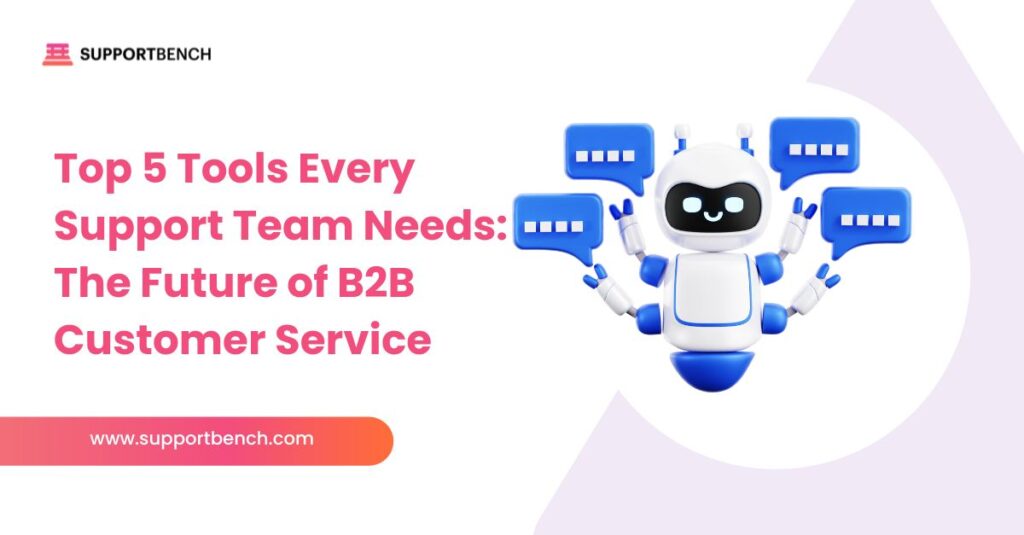B2B customer support is no longer about putting out fires. Today’s clients expect proactive solutions, consistent communication, and fast resolution—across every channel. Meeting those expectations takes more than skilled agents. It requires the right combination of tools to unify systems, automate routine tasks, and maintain high service standards at scale.
This guide outlines the five most important tools that help B2B support teams deliver efficient, trustworthy service, while reducing complexity behind the scenes. Whether you’re building a new tech stack or upgrading your current setup, these tools form the foundation of a modern, high-performing support operation.
And for teams ready to go further, we’ll also explore the essential platform features that help scale quality service across growing customer bases.
At a Glance:
B2B customer support takes more than skilled agents—it needs the right tools. A strong CRM, AI automation, dynamic SLAs, omnichannel platforms, and knowledge management help teams cut complexity, build trust, and scale effectively. Supportbench brings these essentials together in one platform, built for secure and scalable B2B success.
Must-Have Tools for Modern B2B Customer Support Teams
In today’s B2B environment, customer support isn’t just about solving individual tickets. It’s about sustaining long-term relationships across onboarding, adoption, and renewal. That level of service takes more than skilled agents. It requires the right technology stack—tools that ensure every interaction is timely, contextual, and aligned with broader customer success goals.
Here are five foundational tools that forward-looking support teams rely on to scale service without sacrificing quality.

1. CRM Systems with Deep Integration
A deeply integrated CRM is the single most important tool in modern support. When CRM and support platforms sync bi-directionally, agents can instantly view the entire customer journey—from product usage trends and open opportunities to past tickets and renewal milestones. This visibility empowers teams to offer support that’s not just reactive but proactive and personalized.
On the customer success side, this integration becomes a shared source of truth. Success managers can spot adoption gaps or flag accounts showing signs of churn risk using the same timeline agents rely on. With everything aligned in one system, teams collaborate more easily, and customer outcomes improve at every stage of the lifecycle.
2. AI-Powered Support (Chatbots, Summaries, Insights)
AI has moved from hype to impact. Smart support tools now automate repetitive interactions, summarize long case threads, and detect customer sentiment in real time. That means faster triage, better tone calibration, and fewer missteps across complex accounts.
For agents, AI cuts down on cognitive load, highlighting relevant knowledge base articles or predicting next steps. For customer success teams, it functions as an early warning system. Declining sentiment or repeat issues surface before they affect renewals. By embedding AI into daily workflows, teams respond faster, support more customers, and do it all with sharper context.
3. Dynamic SLA Management
Static SLAs fall short in B2B settings, where different clients require different levels of urgency. Dynamic SLA tools change that by adapting to contract terms, account value, and time-sensitive events like renewals or product launches.
For example, an SLA might tighten automatically when a renewal is 30 days out, ensuring top-tier support when it matters most. Breach warnings, entitlement-based targets, and tier-based routing ensure every case receives the attention it deserves, without overwhelming the queue. This agility builds trust with customers and helps teams manage competing priorities more strategically.
4. Omnichannel Support Platforms
B2B buyers expect to reach you where it’s convenient—email, chat, phone, or web. An omnichannel platform brings all of those interactions into one workspace, giving agents full visibility into the customer’s history regardless of channel.
The result is seamless service. Agents can pick up a conversation that started on live chat and continue it via email, without asking customers to repeat themselves. It also allows teams to apply channel-specific SLAs and tailor escalation paths to the situation. For long-term B2B relationships, this consistency strengthens credibility and reinforces the perception of a professional, responsive support function.
5. Knowledge Bases and Self-Service Portals
Even in high-touch support models, customers prefer to solve simple issues on their own. A well-structured knowledge base makes that possible, reducing ticket volume, shortening resolution times, and improving customer confidence.
For internal teams, the knowledge base serves as a training and reference tool, ensuring consistent responses and reducing onboarding time for new hires. When managed through structured content practices like KCS, it evolves with your product and customer needs. In fast-paced B2B environments, this ability to deflect routine inquiries while preserving depth is what keeps service scalable without compromising on quality.
These five tools lay the foundation for efficient, high-quality B2B support.
But as your operations grow, maintaining excellence at scale takes more than just strong tools. You’ll need features that preserve context, automate complexity, and support personalized service across growing teams and customer bases.
You Might Also Like:
Essential Features for Growing B2B Teams
As B2B teams expand, essential features help maintain efficiency, personalization, and scalability in customer support.
Advanced CRM Integration
Deep CRM integration is critical for delivering personalized support at scale. By consolidating customer records across sales and service, teams can track every interaction and use historical data to predict future needs. This not only improves response quality but also strengthens renewal conversations and upsell opportunities.
Customizable Workflows & Automation
Complex B2B queries often involve multiple steps and stakeholders. Workflow automation and custom templates remove repetitive tasks, streamline operations, and keep case handling consistent. The result is greater efficiency; agents spend less time on manual routing and more time resolving high-value issues.
Comprehensive Knowledge Management
Knowledge bases and self-service tools are central to reducing support workload. When structured properly, they give customers quick access to answers, deflect routine tickets, and maintain consistency across teams. Regular reviews ensure that articles remain accurate, helping both customers and agents resolve issues more quickly.
AI-Powered Insights
AI-driven insights improve service by guiding agents in real time. From suggesting relevant knowledge base articles to highlighting risks before escalation, these insights anticipate customer needs and enable faster, more effective responses. For growing teams, this proactive support capability is a key differentiator.
Popular Customer Support Tools: A B2B Perspective
Modern B2B support teams operate in high-stakes environments, where long-term client relationships, complex service entitlements, and multi-department coordination are the norm.
Choosing the right platform isn’t just about ticketing; it’s about finding a solution that can handle account-based service models, dynamic SLA enforcement, and proactive customer success alignment.
Among the most widely used tools in this space are Supportbench, Zendesk, and Freshdesk. While each platform brings strengths, their suitability for B2B organizations depends on how deeply they support enterprise-level workflows and integrated insights.
Zendesk has long been popular for its polished UI and broad ecosystem, but much of its advanced B2B functionality depends on third-party apps or costly add-ons.
It’s effective for managing transactional queries across multiple channels but may require customization to accommodate strategic support needs like renewal-timed SLAs or success plan visibility.
Freshdesk offers a compelling value proposition for smaller teams with modest requirements. Its omnichannel support and automation capabilities work well in high-volume environments, but deeper account-level insights and advanced workflow flexibility are generally limited to premium tiers.
For B2B teams managing layered accounts or complex entitlements, this often creates friction as they scale.
Supportbench, by contrast, was purpose-built to serve B2B teams with longer customer lifecycles and higher service expectations. Its core architecture unifies CRM context, AI guidance, SLA awareness, and omnichannel support in one interface.
Rather than treating every ticket in isolation, Supportbench connects each conversation to the broader client relationship, ensuring every agent sees historical interactions, current risks, and renewal timelines at a glance.
B2B Support Platform Feature Comparison | |||
|---|---|---|---|
Feature | Supportbench | Zendesk | Freshdesk |
CRM Depth | Built for B2B, Deep Account Context | Integrations, Marketplace Apps | Straightforward Integrations |
AI Features | AI Summaries + SLA Context | Mature Bot Ecosystem | Bot + Ease of Setup |
Omnichannel Workspace | Unified, B2B Workflows | Strong Omnichannel | Omnichannel for SMB–Mid |
Dynamic SLA Rules | Renewal-Aware, Tiered | Plan-Dependent | Plan-Dependent |
Approvals & Parent/Child Cases | Native B2B Patterns | Apps/Enterprise Tiers | Apps/Enterprise Tiers |
Account-Level Reporting | Built-In Roll-Ups | Available by Plan | Available by Plan |
Role-Based Access & Audit | Fine-Grained | Available by Plan | Available by Plan |
Case Swarming | Native Collaboration | App-Based Workflows | App-Based Workflows |
Why Supportbench Stands Out

Supportbench isn’t a generic support platform. It’s a full-stack system tailored to the complexity of B2B service delivery. Where other tools require extensive configuration or patchwork integrations to replicate strategic workflows, Supportbench builds those capabilities directly into the product.
One of its key differentiators is seamless integration across support, CRM, and customer success data. Agents don’t just see tickets. They see customer health scores, contract details, usage history, and upcoming renewal cycles, all in one place. This eliminates silos, improves handoffs, and ensures that support efforts align with broader lifecycle goals.
For growing B2B teams, scalability is embedded at every level. You can define SLA policies that adjust automatically during renewal periods, set routing logic based on account segment or urgency, and deploy escalation workflows tailored to specific contract tiers.
The platform’s flexibility means teams can scale without sacrificing control or context—an essential advantage when client portfolios grow more complex.
Supportbench also meets the data security and compliance demands of enterprise environments. From GDPR readiness to audit trails and encryption protocols, the platform is designed to protect sensitive customer data across every interaction. Role-based permissions ensure appropriate access, while built-in governance tools provide confidence in every action taken by the team.
In short, Supportbench offers what most platforms struggle to deliver out of the box: deep integration, operational agility, and strategic alignment—all critical to delivering high-quality B2B support at scale.
The Bottom Line
The difference between an average support team and a great one comes down to the daily tools they use. Modern customer service requires more than ticket logging. It demands CRM integration for a 360° customer view. It requires AI for faster and more intelligent responses.
Dynamic SLAs help prioritize critical issues. Self-service options give customers quick resolutions. Omnichannel coverage unifies conversations across every channel. Clear reporting ensures accountability.
Strong privacy safeguards protect sensitive data. These are no longer optional. They form the baseline of effective B2B support.
Supportbench consolidates all these capabilities into a single, unified platform. By reducing tool switching and preserving customer context, it equips B2B teams with the structure to deliver consistent, high-quality support today and the adaptability to scale with tomorrow’s demands.
Ready to see how Supportbench can raise your support operations? Book a free demo to see how Supportbench can streamline your operations today.










